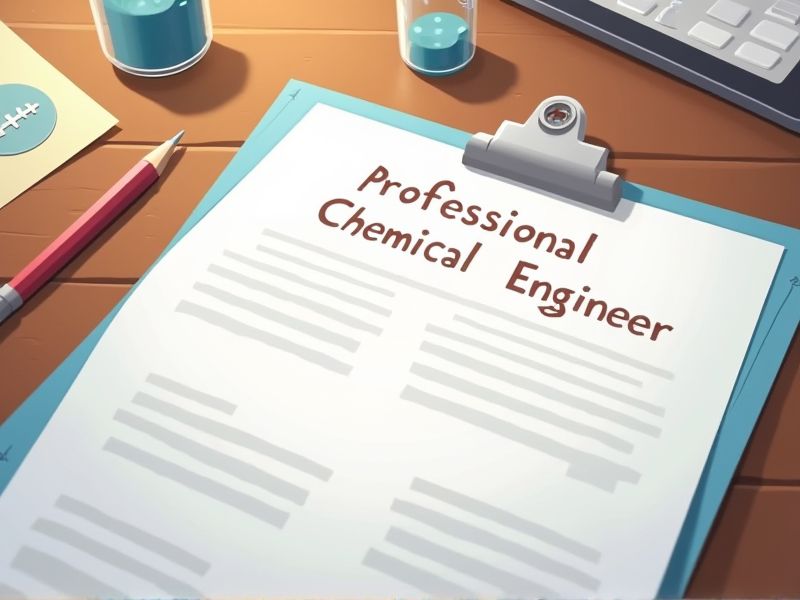
Professional Chemical Engineers require certain certifications primarily to ensure adherence to safety and environmental regulations, given the complex nature of their work. Obtaining these certifications often leads to advanced technical knowledge, contributing to improved efficiency and productivity within chemical processes. Certifications also validate expertise, enhancing credibility and opening doors to managerial and specialized roles. Here are some important certifications you may need as a Professional Chemical Engineer.
Fundamentals of Engineering (FE) Certification
Earning the Fundamentals of Engineering (FE) Certification shows a chemical engineer's proficiency in fundamental concepts and provides a pathway to licensure. The certification is often required by employers to ensure engineers adhere to industry-wide standards, enhancing safety and accountability. Holding an FE certification can increase job prospects and career advancement opportunities by distinguishing certified engineers from their peers. Passing the FE exam establishes a professional foundation, paving the way toward achieving the Professional Engineer (PE) license, which offers legal authority to sign engineering documents.
Professional Engineer (PE) License
Obtaining a Professional Engineer (PE) License ensures that a chemical engineer has met rigorous standards in education, experience, and examination, maintaining public safety and industry reliability. The PE License enables engineers to sign off on projects, allowing them to take legal responsibility for their work. This certification provides clients and employers with a guarantee of competence and ethical practice in engineering endeavors. Having a PE License often leads to career advancements and higher earning potential, reflecting its value in professional development.
Certified Chemical Process Safety Professional (CCPS)
Certified Chemical Process Safety Professional (CCPS) credentials elevate a professional chemical engineer's expertise in managing and mitigating risks in chemical processes. Engineers with CCPS certification contribute to improved safety protocols, which directly reduce workplace hazards and accident rates. The demand for such specialized knowledge often results in better career opportunities and higher earning potential. Regulatory compliance and industry standards increasingly emphasize safety, making CCPS certification a strategic advantage in the professional sphere.
Six Sigma Green Belt Certification
Obtaining a Six Sigma Green Belt Certification equips chemical engineers with data-driven methodologies to enhance process efficiency, directly reducing waste and increasing productivity in chemical processes. The certification fosters improved problem-solving skills, enabling engineers to systematically analyze and refine industrial operations. Chemical engineers with this credential often drive cost-effectiveness and quality improvements, leading to higher competitiveness in the industry. Many organizations recognize the value of Six Sigma, increasingly favoring certified professionals for leadership and project management roles.
Six Sigma Black Belt Certification
Obtaining a Six Sigma Black Belt Certification enhances a chemical engineer's ability to use data-driven methods to improve process efficiency and reduce waste, leading to cost savings and increased productivity. Mastery of Six Sigma tools enables engineers to identify and solve complex engineering problems with precision and effectiveness. Certification often opens up leadership opportunities, where engineers can lead and manage process improvement projects across various stages of production. It provides a recognized framework for driving quality and excellence, essential in meeting industry standards and compliance requirements in chemical engineering.
Project Management Professional (PMP) Certification
Possessing a PMP certification equips chemical engineers with essential skills to manage complex projects effectively, often leading to improved project outcomes. In industries where chemical engineering projects involve significant coordination of resources and timelines, PMP-certified engineers are better positioned to ensure project success and stakeholder satisfaction. The certification often increases a chemical engineer's earning potential and opens up opportunities for advancement within their organizations. Employers tend to prefer PMP-certified candidates due to their verified project management expertise, contributing to enhanced team performance and productivity in engineering projects.
Certified Hazardous Materials Manager (CHMM)
A Certified Hazardous Materials Manager (CHMM) enhances a chemical engineer's ability to manage hazardous materials safely, mitigating potential risks. This certification ensures compliance with environmental regulations that are crucial in chemical engineering projects. It adds credibility and validates a chemical engineer's expertise in handling hazardous substances. Employers often seek CHMM-certified professionals to reduce liability and improve workplace safety standards.
OSHA HAZWOPER Certification
Professional chemical engineers working in environments with hazardous substances must obtain OSHA HAZWOPER certification to ensure they understand proper safety protocols. This certification is necessary to mitigate risks of exposure to harmful chemicals and prevent accidents in the workplace. Understanding hazardous material handling and emergency response helps in maintaining regulatory compliance, which is essential for safety and legal reasons. Employers often require this certification to verify that engineers possess the necessary skills to handle hazardous situations safely and effectively.
Lean Six Sigma Certification
Lean Six Sigma Certification equips professional chemical engineers with process improvement skills that lead to enhanced efficiency and reduced waste. Employers often seek certified professionals to drive cost reductions and improve product quality, resulting in a competitive edge. Certified engineers gain expertise in data-driven decision-making, increasing their competency in handling complex projects. The certification fosters a culture of continuous improvement, aligning closely with the rigorous standards and methodologies demanded in the chemical engineering field.
Process Safety Management (PSM) Certification
Process Safety Management (PSM) certification equips chemical engineers with the knowledge to prevent hazardous chemical releases, reducing risk in industrial operations. Enhanced understanding of safety protocols allows engineers to design and maintain safer chemical processes. Holding a PSM certification increases a professional's credibility, often leading to better career opportunities and advancement. Regulatory bodies expect a thorough understanding of PSM principles to ensure compliance with safety standards and protect both workers and the environment.
Summary
By obtaining certifications, you strengthen your professional credibility in the field of chemical engineering. This leads to heightened career prospects, often resulting in increased job opportunities and higher salary potential. With certifications, you also gain specialized knowledge that enhances your problem-solving skills, making you more effective in your role. Employers often recognize these credentials as a testament to your commitment to continuous learning and professional excellence.
